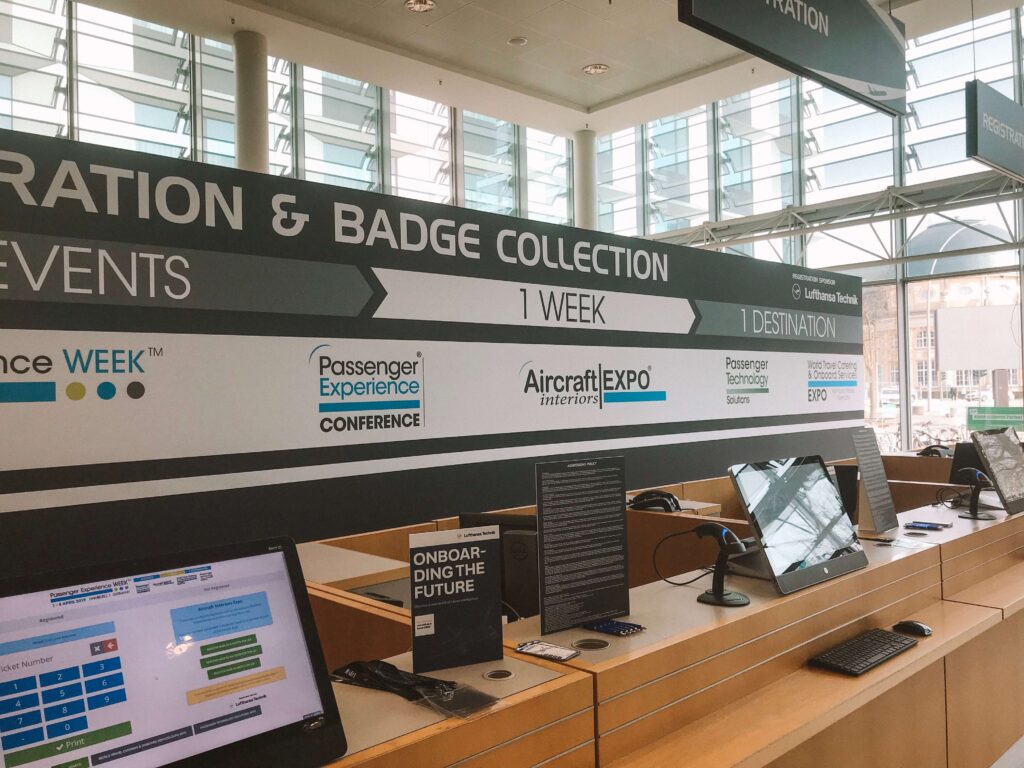From newer, speedier aircraft cabin wi-fi solutions to 3D seats printing as a more efficient way of manufacturing, Passenger Experience Week Show 2019 kicked off last week for the twentieth time, to unveil some of the latest breakthroughs of the industry.
AeroTime takes a look at the most memorable trends, showcased during the event.
Towards a less disposable industry
Sustainability questions were on the front burner this year. Recycled products, reusable materials, increased recycling – everything related to making aviation industry less disposable and more sustainable, dominated the agenda.
Many projects were aimed at raising social responsibility and offered different options to replace the existing on-board food packaging. Some of the alternatives (for instance, the one demonstrated by En Route International, UK-based on-board food and services provider) were made of fully compostable materials. Developers claimed the new packages have the potential to reduce product weight to almost 20 tonnes per annum across the airline. Reducing the total weight, it eventually could help lower the volume of fuel burn.
Cabin interiors: brightest picks
AIX Aircraft Interiors Expo 2019, a major conference stream, specified one of the most notable seasonal trends: adapting ideas and inspiration from the car industry.
Some experts expressed their belief that soon cabin interiors might be modelled by car manufacturers. For example, Christian Langer, VP Digital Strategy of Lufthansa Group, finds innovative cycle of car industry much quicker than the one of aviation industry’s. And this is a push for aviation to speed up its own innovation cycles, which take years now.
Another car reference was to be found in seat development projects. JPA Design and Williams Advanced Engineering (a company, known for developing hybrid systems for Formula One) partnered to work on a very unusual seat project, powered with composites traditionally used in racing cars manufacturing.
Airbus presented its A320 and A330 cabin models fitted with the latest configuration elements, including virtual reality features. Visitors could explore different seat cover materials, variety of lightning options, integrated gadgets and more.
Following two recent crashes and 737MAX groundings, Boeing’s new flagship 777X presentation was not a large media celebration as it was originally expected. The airframer gave a sneak peak on its brand new 777X interiors, that will have a different arc of ceiling to help reach more spaciousness, different luggage bins design, larger cabin and windows.
Free on-board wi-fi – finally here?
Not only has Apple recently announced the launch of its own TV services, but also got around to introduce a new collab with American Airlines (A1G) (AAL) . Companies joined forces to present a new project – free access to Apple Music with no additional fee for wi-fi. The turn might look like the first step towards the free on-board wi-fi, with the only exception: the services are only available for Apple subscribers. In case you don’t have a subscription, you are offered with three trial months, and when your three months are gone – you are automatically forced to buy the full subscription.
Passengers who struggle with jetlags would be interested to try the new Etihad mobile application. Partnering with Panasonic and Detalytics, the airline introduced a mobile app that helps improve inflight wellness when dealing with jetlag. The app generates individual solutions, based on passenger’s inputs, like weight, chronotype, type of travel, etc.
Cabins getting smarter
Even though the conference was dedicated to passenger experience, it introduced a bunch of useful solutions for cabin crew, too. A Smart Cabin System displayed by the US company Astronics can help flight assistants control if the passengers’ belts are seated during take-off and landing, avoiding the hands-on verifications. The Cabin System uses different sensors to monitor and oversee safety elements. Data is then transmitted to server, allowing cabin crew instant information access via tablets.
Boeing SmartCabin programme proposed a similar concept. The so-called “smart home in the sky” cabin involves automatic cabin control systems, that can replace the actions currently performed by flight attendants (like locking and unlocking the lavatory doors). Other than that, entertaining features of SmartCabin include LED night sky projections on a cabin ceiling, showing the exact image of sky area, aircraft is flying through.
Cabin driven by data was also the key concept pushed forward by Airbus. Airbus Connected Experience, introduced by the company, hopes to enhance passenger experience helping cabin crew work more efficiently. As well as Astronics project, Airbus cabin is based on Internet of things, but with a larger focus on passengers’ experience personalization, allowing them order food, beverages or other goods using the devices right from their seats. Passengers get a chance to input their own data about preferences and services quality, and for airlines the innovation brings additional opportunities to boost ancillary revenues.
The conference took place April 1 – April 4, 2019 in Hamburg, Germany.

